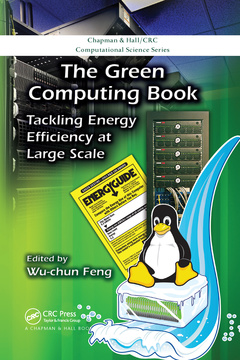Description
The Green Computing Book
Tackling Energy Efficiency at Large Scale
Chapman & Hall/CRC Computational Science Series
Language: English
Subjects for The Green Computing Book:
Keywords
Power Consumption; Energy Savings; large-scale green computing; Execution Time; low-power; high-performance designs for large-scale computing systems and components; Dynamic Compiler; server costs; energy use; and performance at high-density computing facilities; Energy Efficiency; Green Destiny supercomputer; Run Time System; Green500; Cpu Utilization; energy management and virtualization in cloud computing; Power Budgeting; IBM Blue Gene; Blue Gene; energy efficiency of a large-scale computing system; Cpu Frequency; demand response policies in computing centers; Blue Gene System; impact of servers on data center costs; Cpu Energy; Data Sets; Cpu Energy Consumption; Disk Layout; Performance Slowdown; Management Partition; Voltage Scaling; Energy Conservation; Guest VMs; P0 P1 P2 P3 P4; Power Management Solutions; Idle Periods; Loop Nest; HPC Application
Publication date: 09-2020
· 15.6x23.4 cm · Paperback
Publication date: 06-2014
337 p. · 15.6x23.4 cm · Hardback
Description
/li>Contents
/li>Readership
/li>Biography
/li>
State-of-the-Art Approaches to Advance the Large-Scale Green Computing Movement
Edited by one of the founders and lead investigator of the Green500 list, The Green Computing Book: Tackling Energy Efficiency at Large Scale explores seminal research in large-scale green computing. It begins with low-level, hardware-based approaches and then traverses up the software stack with increasingly higher-level, software-based approaches.
In the first chapter, the IBM Blue Gene team illustrates how to improve the energy efficiency of a supercomputer by an order of magnitude without any system performance loss in parallelizable applications. The next few chapters explain how to enhance the energy efficiency of a large-scale computing system via compiler-directed energy optimizations, an adaptive run-time system, and a general prediction performance framework. The book then explores the interactions between energy management and reliability and describes storage system organization that maximizes energy efficiency and reliability. It also addresses the need for coordinated power control across different layers and covers demand response policies in computing centers. The final chapter assesses the impact of servers on data center costs.
Low-Power, Massively Parallel, Energy-Efficient Supercomputers. Compiler-Driven Energy Efficiency. An Adaptive Run-Time System for Improving Energy Efficiency. Energy-Efficient Multithreading through Run-Time Adaptation. Exploring Trade-Offs between Energy Savings and Reliability in Storage Systems. Cross-Layer Power Management. Energy-Efficient Virtualized Systems. Demand Response for Computing Centers. Implications of Recent Trends in Performance, Costs, and Energy Use for Servers.
Wu-chun Feng is a professor in the Department of Computer Science and Department of Electrical & Computer Engineering at Virginia Polytechnic Institute and State University, where he is the director of the Synergy Laboratory. He is also the principal investigator of mpiBlast and Supercomputing in Small Spaces, founder of MyVICE, and co-founder of the Green500 list. His research interests lie broadly at the synergistic intersection of computer architecture, systems software and middleware, and applications software.




